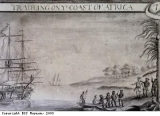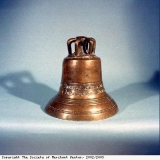Roots of racism
Contrary to popular opinion, the early relationships between Europeans and Africans were not always determined by racist attitudes. Property ownership and religion probably did as much to affect the status of a black person as did his or her colour. High status Africans, often the sons of kings and slave-trading chiefs, visited Europe and were treated as important guests. But with the advent of the transatlantic slave trade , slave status was increasingly linked with black Africans.
The fact that many Africans were not Christians, but ‘heathen’ or non-believers, made them seem different to Christian Europe. It was easier to buy and sell people who were ‘not one of us’ in both colour and religion. There was also the Biblical story of Noah and his sons, which could be interpreted in a way that justified slavery. Noah’s son Ham was disrespectful to his father. For this, he was cursed by Noah. The curse said that Ham and his descendants would have to serve the descendants of his more respectful brothers. As the transatlantic slave trade developed, Ham became identified with the African people. This story could therefore be used to justify their enslavement.
In addition, new ideas about the scientific classification of people and animals in the 18th century began to focus attention on the differences between people. Those who supported slavery were quick to bend science to their own political beliefs, so that by the 19th century a more developed body of racist thought was on the rise.




